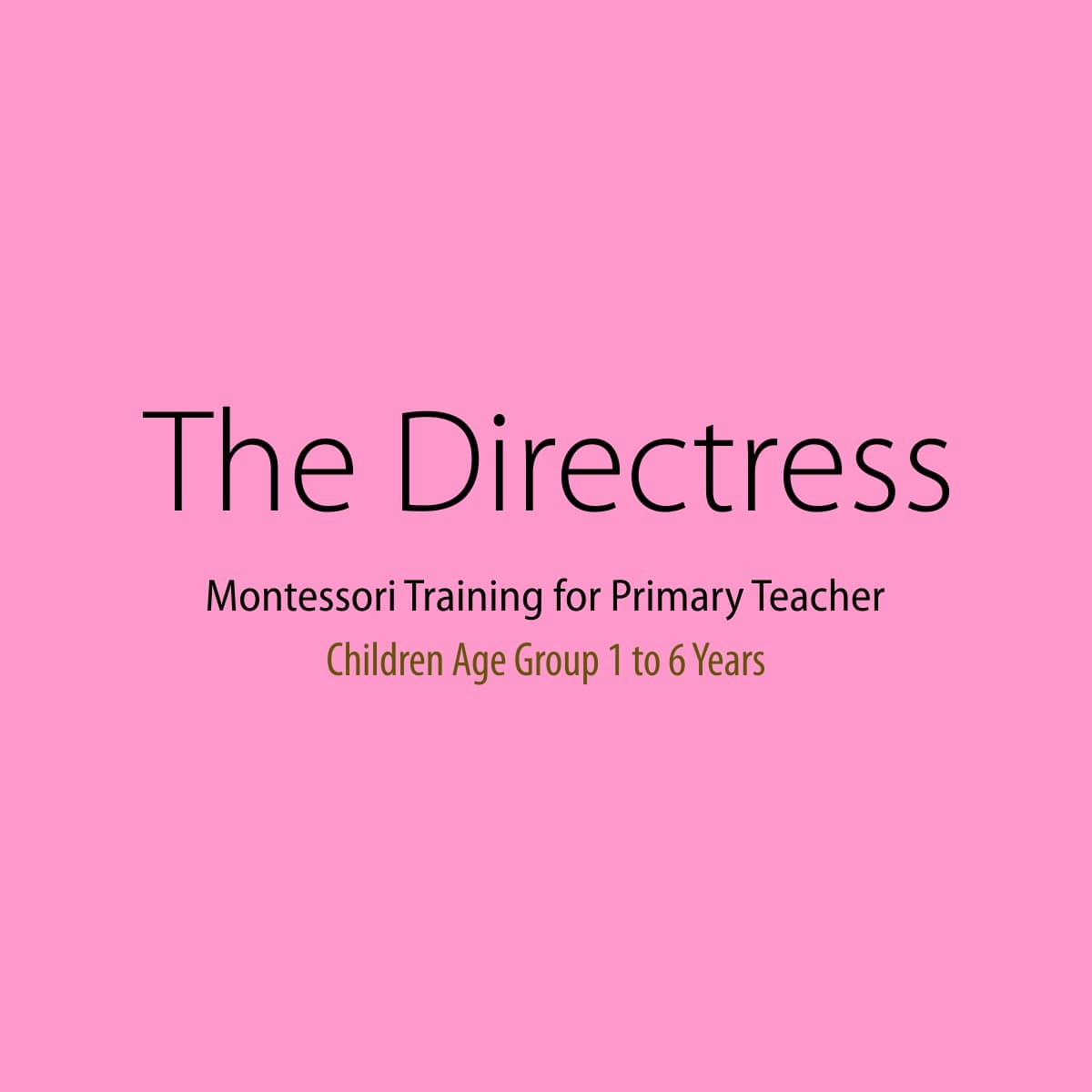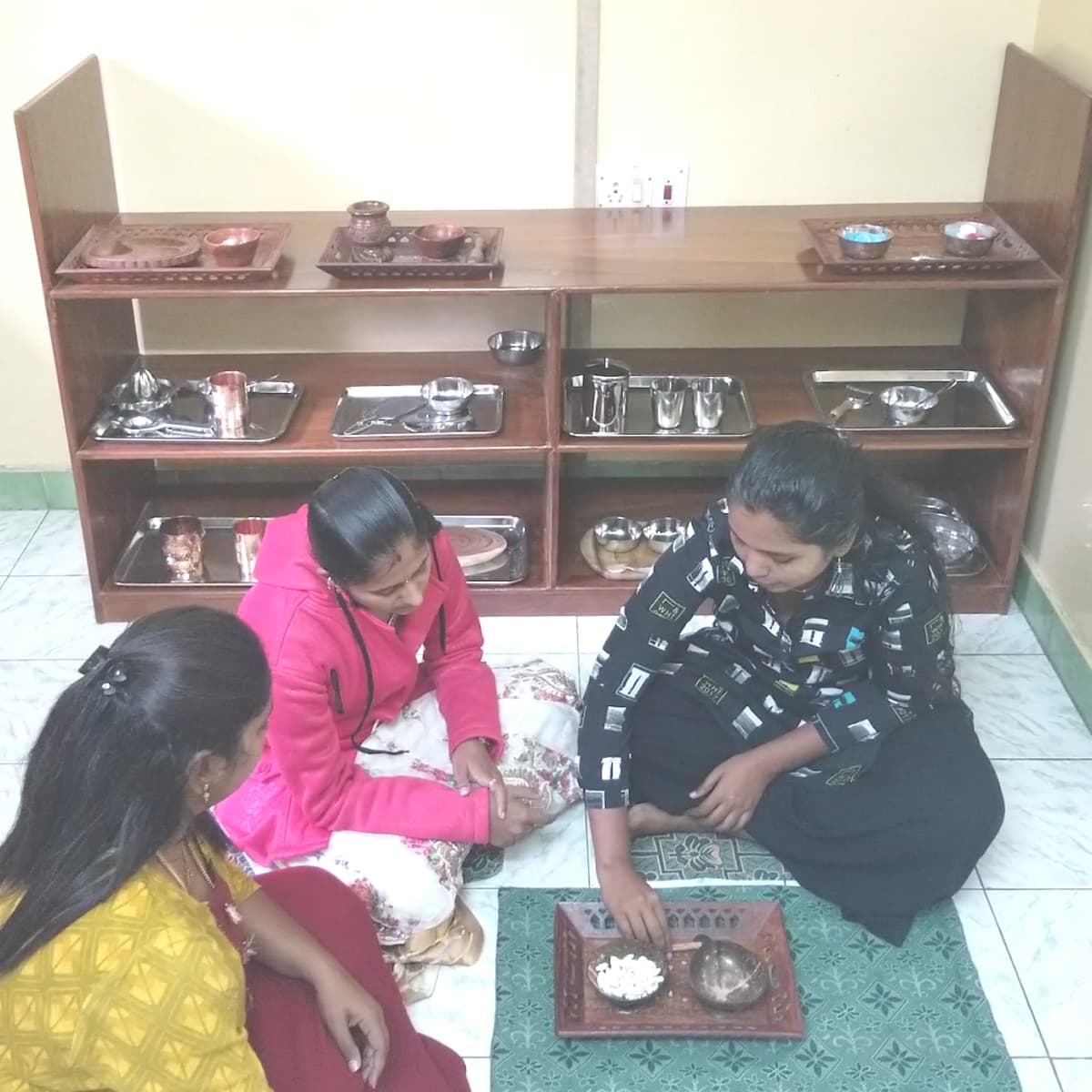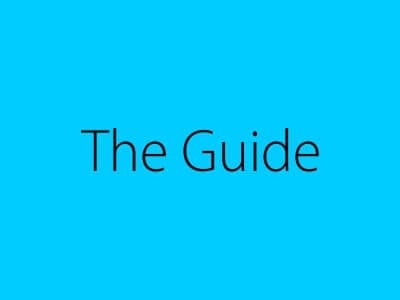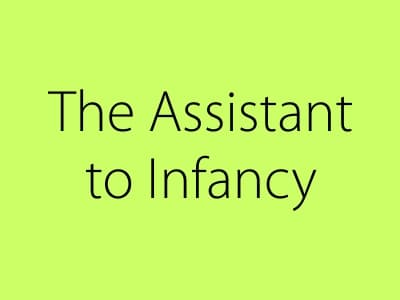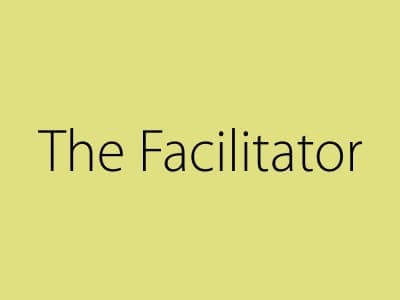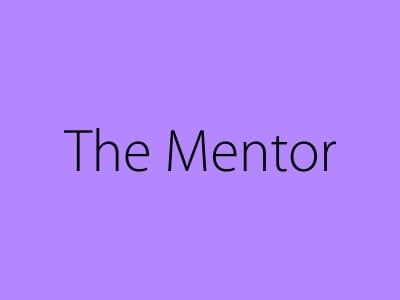Course Info:
The Directress is a Montessori Primary/Early childhood diploma program for teachers. It is an in-depth study of Montessori Pedagogy with exclusive focus on the developmental needs of children in the age group of 3 to 6 years. This course also offers the basic knowledge about Bith to 3 years Child
Course Ratings:
-
Course Excellence
%
-
Ease of Learning
%
-
Adaptability
%
-
Employed
%
Course Metrics:
Course Overview
How the Course is StructuredTheory Sessions|Practicum Classes|Year Long Project|Internship
| Theory Sessions: 200 hours | Follow up Sessions: 200 hours Max. | |
|---|---|
| Overview | Topics |
| Human Development |
|
| Montessori Philosophy & Pedagogy |
|
| Indian Ancient Wisdom for Child Development |
|
| Classroom Leadership & Program Management |
|
| Curriculum Implementation: |
|
Community Involvement and Partnership with Families |
|
| Practicum Sessions: 400 hours | Follow up Sessions: 200 hours Max. |
|---|
| Practicum hours do not include, independent research, material making, album preparation and/or examinations. |
| Yearlong Project |
|---|
| In class Yearlong Project work can comprise no more than 16 academic contact hours. |
| Internship | Inschool Training |
|---|
| 200 Hours of Internship in Schools involve Assisting Children & Observation as per the school code. |
| Program Imparts Core Knowledge Categories | |
|---|---|
|
|
If you are looking for any specific detail, please reach us through mail or phone. Thank You.
Course Curriculum
What the Course offers to YouMontessori Philosophy and Pedagogy |Human and Child Development|Classroom Leadership & Program Administration |Community Involvement and Partnership with Families |Curriculum Implementation: Practical Life |Curriculum Implementation: Art, Music & Perceptual Motor Development |Curriculum Implementation: Sensorial |Curriculum Implementation: Mathematics |Curriculum Implementation: Science |Curriculum Implementation: Cultural Subjects |Curriculum Implementation: Language |Practicum
Module 1 of 12 : Montessori Philosophy and Pedagogy
Module 1 of 12 : Montessori Philosophy and Pedagogy
| Course Categaory: | Montessori Philosophy and Pedagogy |
| Minimum course Topics: |
|
| Hours: | 45 to 75 plus hours |
| Course Description: | Through lecture, group process, reading assignments, observation and development as well as her implemented pedagogy for the primary aged child. Students shall demonstrate a gained confidence in applying methodology, guiding children and creating aesthetic Montessori classroom environments, display the appropriate scope and sequence of the Montessori curriculum. Adult learners shall continually demonstrate self-reflection and personal development within their practice. |
| Course Work Examples: |
|
| Competencies Assessment: (Suggested Evidence) |
|
| Course Knowledge Categories: |
|
| Level of Content: | Set One and Set Two |
| Course Outcomes: |
|
Module 2 of 12 : Human & Child Development
Module 2 of 12 : Human & Child Development
| Course Categaory: | |
| Minimum course Topics: |
|
| Hours: | 25 to 50 plus hours |
| Course Description: | Through lecture, group process and discussion, students will learn about the various theories from major contemporary child and human developmental theorists to increase their personal awareness of the growth of each individual child from dependency through autonomy. |
| Course Work Examples: |
|
| Competencies Assessment: (Suggested Evidence) |
|
| Course Knowledge Categories: |
|
| Level of Content: | Set One and Set Two |
| Course Outcomes: |
|
Module 3 of 12 : Classroom Leadership & Program Administration
Module 3 of 12 : Classroom Leadership & Program Administration
| Course Categaory: | Classroom Leadership & Program Administration |
| Minimum course Topics: |
|
| Hours: | 25 to 45 plus hours |
| Course Description: | Through lecture, group process and discussion, and classroom observations will provide adult learners with tools and techniques to further their knowledge of interpersonal communication with staff, classroom observation, record-keeping and assessment tools. Learners will be introduced to the components of managing a Montessori program and research the structure both physically and financially, of various types of Montessori schools: private, public, charter and management as well as how these school systems align with state and central early childhood learning standards. |
| Course Work Examples: |
|
| Competencies Assessment: (Suggested Evidence) |
|
| Course Knowledge Categories: |
|
| Level of Content: | Set One and Set Two |
| Course Outcomes: |
|
Module 4 of 12 : Community Involvement and Partnership with Families
Module 4 of 12 : Community Involvement and Partnership with Families
| Course Categaory: | Community Involvement and Partnership with Families |
| Minimum course Topics: |
|
| Hours: | 10 to 40 plus hours |
| Course Description: | Through lecture, group process, classroom observation and discussion, adult learners will be presented with best practices for involving, supporting and educating parents and community members including parent events and conferences. |
| Course Work Examples: |
|
| Competencies Assessment: (Suggested Evidence) |
|
| Course Knowledge Categories: |
|
| Level of Content: | Set One and Set Two |
| Course Outcomes: |
|
Module 5 of 12 : Curriculum Implementation: Practical Life
Module 5 of 12 : Curriculum Implementation: Practical Life
| Course Categaory: | Curriculum Implementation: Practical Life |
| Minimum course Topics: |
|
| Hours: | 35 to 75 plus hours |
| Course Description: | Through lecture, material presentations, group process and discussion, as well as supervised practice with materials, adult learners discover the appropriate age, direct aim, indirect aim and precise presentation of the practical life curriculum sequence. Activities cover care of person, care of environment, fine and gross motor control as well as lessons in grace and courtesy. |
| Course Work Examples: |
|
| Competencies Assessment: (Suggested Evidence) |
|
| Course Knowledge Categories: |
|
| Level of Content: | Set One and Set Two |
| Course Outcomes: |
|
Module 6 of 12 : Curriculum Implementation: Art, Music & Perceptual Motor Development
Module 6 of 12 : Curriculum Implementation: Art, Music & Perceptual Motor Development
| Course Categaory: | Curriculum Implementation: Art, Music & Perceptual Motor Development |
| Minimum course Topics: |
|
| Hours: | 15 to 35 plus hours |
| Course Description: | Through lecture, material presentations, group process and discussion, as well as supervised practice with materials, adult learners discover the appropriate age, direct aim, indirect aim and precise presentation of the art skills, music and perceptual motor development curriculum. |
| Course Work Examples: |
|
| Competencies Assessment: (Suggested Evidence) |
|
| Course Knowledge Categories: |
|
| Level of Content: | Set One and Set Two |
| Course Outcomes: |
|
Module 7 of 12 : Curriculum Implementation: Sensorial Development
Module 7 of 12 : Curriculum Implementation: Sensorial Development
| Course Categaory: | Curriculum Implementation: Sensorial |
| Minimum course Topics: |
|
| Hours: | 35 to 75 plus hours |
| Course Description: | Through lecture, material presentations, group process and discussion, as well as supervised practice with materials, adult learners discover the appropriate age, direct aim, indirect aim and precise presentation of the sensorial curriculum sequence. Activities aim to isolate the development of the senses by challenging the child to discriminate geometric forms, colors, dimensions, shapes, textures, sounds, weights, temperatures, tastes and smells. |
| Course Work Examples: |
|
| Competencies Assessment: (Suggested Evidence) |
|
| Course Knowledge Categories: |
|
| Level of Content: | Set One and Set Two |
| Course Outcomes: |
|
Module 8 of 12 : Curriculum Implementation: Sensorial Math
Module 8 of 12 : Curriculum Implementation: Sensorial Math
| Course Categaory: | Curriculum Implementation: Sensorial Mathematics |
| Minimum course Topics: |
|
| Hours: | 35 to 75 plus hours |
| Course Description: | Through lecture, material presentations, group process and discussion, as well as supervised practice with materials, adult learners discover the appropriate age, direct aim, indirect aim and precise presentation of the mathematics curriculum sequence. Activities cover one-to-one correspondence, numeration, linear counting, the decimal system (golden bead material), operations (addition, subtraction multiplication, and division), and memorization of facts, fractions, story problems, money and materials leading to abstraction. |
| Course Work Examples: |
|
| Competencies Assessment: (Suggested Evidence) |
|
| Course Knowledge Categories: |
|
| Level of Content: | Set One and Set Two |
| Course Outcomes: |
|
Module 9 of 12 : Curriculum Implementation: Science
Module 9 of 12 : Curriculum Implementation: Science
| Course Categaory: | Curriculum Implementation: Science |
| Minimum course Topics: |
|
| Hours: | 35 to 75 plus hours |
| Course Description: | Through lecture, material presentations, group process and discussion, as well as supervised practice with materials, adult learners discover the appropriate age, direct aim, indirect aim and precise presentation of the science curriculum sequence. Activities cover lessons in history, geography, zoology, botany as well as physical science experiments. |
| Course Work Examples: |
|
| Competencies Assessment: (Suggested Evidence) |
|
| Course Knowledge Categories: |
|
| Level of Content: | Set One and Set Two |
| Course Outcomes: |
|
Module 10 of 12 : Curriculum Implementation: Cultural Subjects
Module 10 of 12 : Curriculum Implementation: Cultural Subjects
| Course Categaory: | Curriculum Implementation: Cultural Subjects |
| Minimum course Topics: |
|
| Hours: | 35 to 75 plus hours |
| Course Description: | Through lecture, material presentations, group process and discussion, as well as supervised practice with materials, adult learners discover the appropriate age, direct aim, indirect aim and precise presentation of the cultural studies curriculum sequence. Activities cover lessons in care of the living world, cosmic awareness, and cultural traditions as well as lessons in cultural diversity and peaceful negotiation. |
| Course Work Examples: |
|
| Competencies Assessment: (Suggested Evidence) |
|
| Course Knowledge Categories: |
|
| Level of Content: | Set One and Set Two |
| Course Outcomes: |
|
Module 11 of 12 : Curriculum Implementation: Language Development
Module 11 of 12 : Curriculum Implementation: Language Development
| Course Categaory: | Curriculum Implementation: Language |
| Minimum course Topics: |
|
| Hours: | 35 to 75 plus hours |
| Course Description: | Through lecture, material presentations, group process and discussion, as well as supervised practice with materials, adult learners discover the appropriate age, direct aim, indirect aim and precise presentation of the language curriculum sequence. Activities cover lessons language reception, expression, articulation, phonetics, oral traditions, story-telling, basic reading, grammar and writing. |
| Course Work Examples: |
|
| Competencies Assessment: (Suggested Evidence) |
|
| Course Knowledge Categories: |
|
| Level of Content: | Set One and Set Two |
| Course Outcomes: |
|
Module 12 of 12 : Curriculum Implementation: Practicum
Module 12 of 12 : Curriculum Implementation: Practicum
| Course Categaory: | Practicum |
| Minimum course Topics: |
|
| Hours: | 400 to 600 plus hours |
| Course Description: | Through lecture, material presentations, group process and discussion, as well as supervised practice with materials, adult learners discover the appropriate age, direct aim, indirect aim and precise presentation of the language curriculum sequence. Activities cover lessons language reception, expression, articulation, phonetics, oral traditions, story-telling, basic reading, grammar and writing. |
| Course Work Examples: |
|
| Competencies Assessment: (Suggested Evidence) |
|
| Course Knowledge Categories: |
|
| Level of Content: | Set One and Set Two |
| Course Outcomes: |
|


